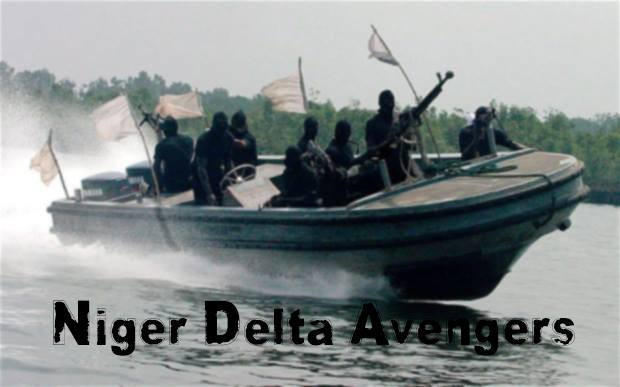Niger Delta militants vow to shut oil and gas plants unless Nnamdi Kanu, Sambo Dasuki released

A militant group in Nigeria's oil-rich Niger Delta area has warned the government it has two weeks to release pro-Biafran leader Nnamdi Kanu and former security aide Sambo Dasuki or it will shut down oil and gas facilities in the country. The Egbesu Mightier Fraternity (EMF), a faction of the newly established Niger Delta Avengers (NDA) militant group, also urged the military to leave Gbaramatu Kingdom, in the Delta State.
"We, the Egbesu Mightier Fraternity, is warning the Federal Government of Nigeria to release the IPOB leader and the former National Security Adviser, Colonel Sambo Dasuki in the next two weeks unconditionally or they will regret not listening to us," the group said in a statement, according to the Vanguard newspaper.
"The Federal Government is also directed to ask the military to leave Gbaramatu Kingdom within the same period or else we are going to shut down every oil and gas activity in the region."
NDA is the latest militant organisation to wage war against the Nigerian government due to perceived marginalisation in the Niger Delta. The group describes itself as a group of Niger Deltans on a "revolution to free Nigeria from the wicked administration".
Attacks on oil facilities blamed on the group have partially halted oil production. Meanwhile, Nigeria removed oil subsidy and increased petroleum prices by two-thirds, in a bid to curb an ongoing fuel crisis.
President Muhammadu Buhari has accused the NDA of vandalism and warned that the Nigerian government would deal with the group in the same way it is tackling Boko Haram terrorists in the country's northeast.
British Foreign Minister Philip Hammond said Buhari needed to address the underlying causes of the conflict, amid fears a military confrontation could end in "disaster".
Strategic reasons
EMF also said Chief Government Ekpemupolo or "Tompolo" as he is also known − commander of the Movement for the Emancipation of the Niger Delta (Mend), one of Delta's largest militant groups – was not responsible for the recent bombings of oil and gas pipelines in the region.
"Tompolo is not the problem of Nigeria or behind the problem in Niger Delta, but misrule and high handedness of the Federal Government and its officials," the group said. "Egbesu Mightier Fraternity is part of the bombings. We are responsible. Niger Delta Avengers is a branch of the struggle and nobody should take us for granted or we will do more."
Tompolo – who was granted full amnesty by the Nigerian government in 2009 – publicly distanced himself from NDA. He also urged Nigerian authorities to keep carrying out repair works at the Forcados 48-inch pipeline, damaged by an attack for which NDA claimed responsibility.
Counter-terrorism expert David Otto believes the group is mentioning Tompolo and others for strategic reasons. He told IBTimes UK: "Tompolo may now become an official channel for negotiation between the Avengers and the government as a 'neutral' party. It's a common operational strategy, with ethno nationalist and separatist groups.
"Otherwise the NDA has no benefit to exonerate Tompolo publicly. Their mentioning of his name does not help him, it only draws critical suspicious towards Tompolo," he continued.
"It should not be surprising that the Niger Delta Avengers or their affiliated groups are simply taking advantage of the current chaos to foster their own personal interest and gain ground and community support - necessary for their survival. Hence the reference for immediate release of popular names like Nnamdi Kanu and Sambo Dasuki attracts ground support and sympathy. These are all tactical possibilities we cannot risk to underestimate."

The birth of militant groups in Niger Delta
Militant groups in the oil-rich Niger Delta region took hold in the early 2000s following the deterioration of people's living conditions blamed on the increase of oil-related activities by foreign exploration corporations. Tensions flared up in the local communities as some ethnic groups felt they were being exploited and did not benefit from the crude oil on their land.
The repeated oil spills that considerably damaged the environment and affected people's health further deepened the communities' frustrations. After being elected in 2015, Buhari extended a 2009 amnesty granted to 30,000 former militants in the area.
Nigeria up close: Check out our Flipboard magazine
© Copyright IBTimes 2025. All rights reserved.






















